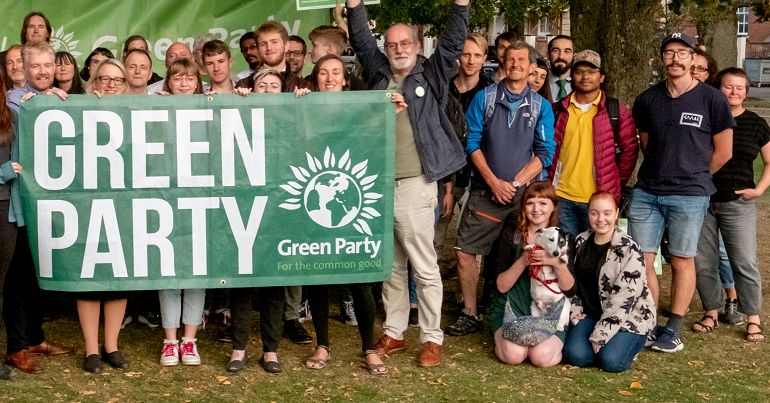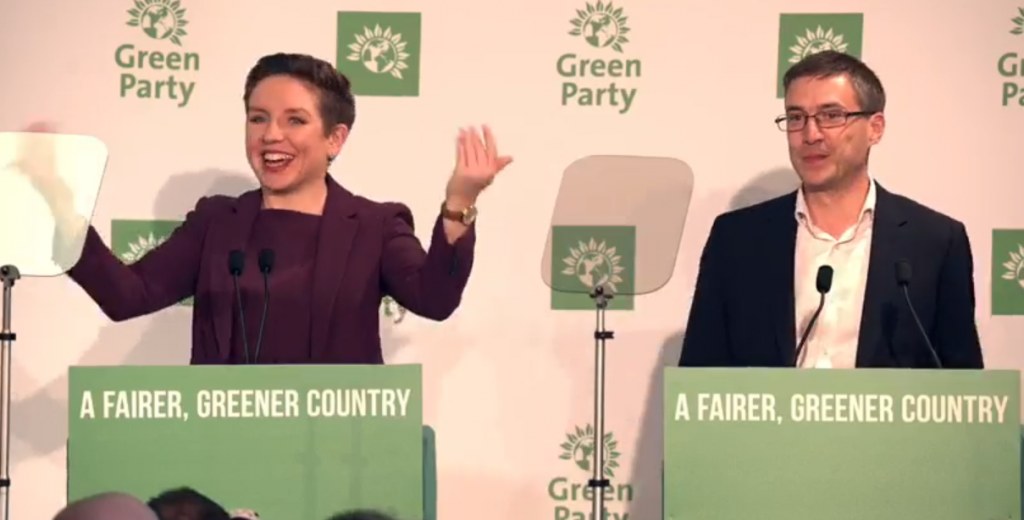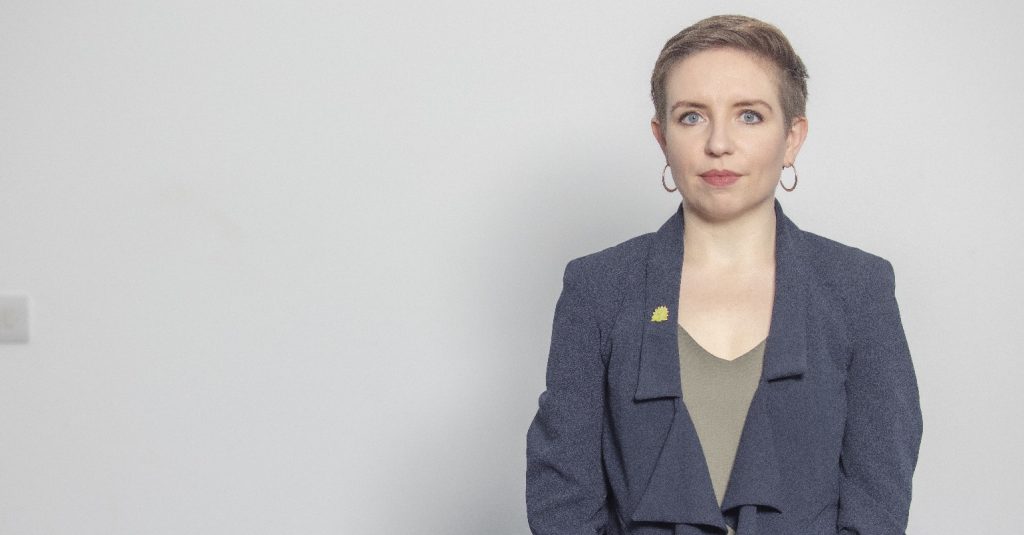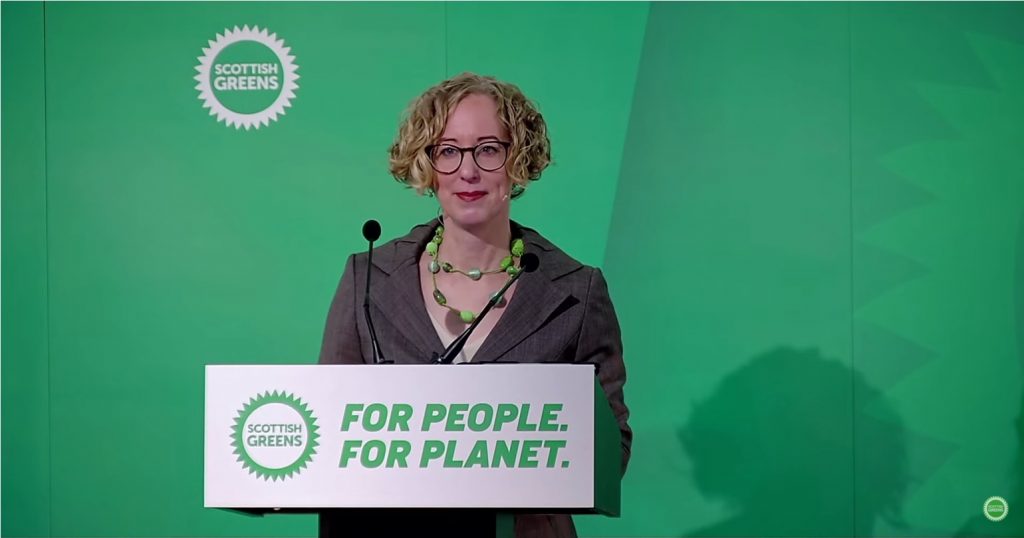6 things we learnt from the first Green Party leadership hustings

The Green Party of England and Wales leadership election is now in full swing. And this evening, members were given their first proper opportunity to question the candidates at the first leadership hustings.
All five tickets were represented – with Tamsin Omond representing team Womack/Omond, Martin Hemingway representing team Hemingway/Rothery and Carla Denyer representing team Denyer/Ramsay.
Over the course of two hours, we learnt a lot about the candidates and their campaigns. Here six of the big takeaways.
1. Progressive alliances are going out of fashion
Progressive alliances used to be all the rage. Caroline Lucas and Jonathan Bartley were big advocates for them when they stood successfully for the leadership in 2016. A number of Greens stood down for Labour or Lib Dem candidates in the 2017 general election. In 2019, the controversial ‘Unite to Remain’ pact saw Greens enter an alliance with the Liberal Democrats and Plaid Cymru.
But this year’s crop of leadership contenders are much less enthusiastic.
While less strident in his opposition, Shahrar Ali – a well known critic of the strategy – implied at the hustings he remained opposed.
Martin Hemingway said that he didn’t see how a progressive alliance could realistically get rid of the Tories and deliver PR.
Carla Denyer said she agreed with the idea of a one off progressive alliance to deliver proportional representation in principle. But she also made clear that Labour have to come on board, that she’s not holding out hope and that the Greens should make clear that Labour are the stumbling block.
Tamsin Omond was noncommittal, instead choosing to talk about the need to grow the party’s membership and strength so as to strengthen its hand in the event of any negotiations with other parties. Nevertheless, Omond described progressive alliances as an “interesting” preposition.
Hardly the ringing endorsement!
Ashley Gunstock was the only contender to explicitly commit to progressive alliances, arguing they were key to getting rid of the Tories. He made this case even in his opening remarks. Later, on the specific question, he said “I don’t think we can avoid getting into positive progressive alliance.”
2. All candidates agreed that the Green Party is anti-capitalist
One of the questions posed to candidates was whether the Green Party is an anti-capitalist party. In what will be music to the ears of the party’s left, all candidates more or less agreed.
Tamsin Omond quoted Audre Lorde’s ‘master’s tools’ proposition before going on to argue that “a system built on capitalism and colonialism that has extraction at its heart” can’t deliver climate justice. They continued by repeating the old Green adage that “we can’t have infinite growth on a finite planet”.
Carla Denyer said “yes I think I do” agree that the party is anti-capitalist. She went on to say that the party is in the business of moving beyond capitalism but this needs to be better messaged for the public.
Martin Hemingway pitched the Green Party as a party opposed to growth and therefore an anti-capitalist party. He said the party was “pursuing different economic ends to those that capitalism pursues”.
Shahrar Ali was in agreement and branded capitalism a “faulty economic system”.
Ashley Gunstock was also in broad agreement that the party is anti-capitalist.
3. The hustings was very cordial
The format of Green Party hustings don’t lend themselves well to conflict between panelists. And hustings over Zoom are are never going to bring such conflicts to life in the way they would in person. Even without the format enabling candidates to respond to each other’s points or to come back in and debate an issue the body language and human connection from a face to face event allows this to bleed through much more readily.
So by all measures the first hustings was incredibly cordial. Despite some pretty significant disagreements (we’ll come to that), for the most part the hustings remained cordial. Candidates calmly responded to the questions in turn.
In 2020’s leadership election, some of the hustings became a lot more heated. Given the stakes, and the nature of disagreements in this year’s contest, this may well happen again as the campaign goes on.
4. Tackling transphobia and antisemitism remain the main points of contention
It will be of little surprise to people following the contest even with the most passing of interest that the issue of transphobia was the primary point of disagreement among contenders. Bundled together in a question on how to tackle both antisemitism and transphobia within the party, the responses from candidates on both these issues were illuminating.
Ashley Gunstock had little to give in terms of practical steps of tackling these issues. He did, however, give a flavour – saying that tackling them is “all about education” to stop people being afraid of things they don’t understand.
He spoke at greater length about antisemitism, recanting stories of his work with school children organising pro-Palestine protests, and his telling them that they shouldn’t conflate the Israeli government with Jewish people.
Carla gave additional context for her response. She argued that the issues with transphobia in the party were part of a “bitter so-called culture war over trans rights”.
Although saying that neither transphobia or antisemitism in the party would be fixed overnight, she said that “we need take a clear and consistent line in support of trans rights, against antisemitism”. She went on to say that she and Adrian Ramsay wanted to make the party more welcoming and inclusive and to work with liberation groups to facilitate workshops on oppression where people can ask questions and learn about that oppression.
She also argued that the disciplinary committee needs to be better resourced to tackle complaints around transphobia and antisemitism. Denyer also reiterated her support for the motion to Green Party Conference which is calling for guidance on antisemitism to be embedded into the party’s constitution. That guidance would include a range of definitions of antisemitism – including that of the International Holocaust Remembrance Alliance (IHRA).
Tamsin Omond came from a similar position on the issues as Denyer. They made the case that reaching out communities experiencing oppression, building trust with them and listening to their experience was crucial.
In addition, Omond said that they and Amelia were committing to build new accountability processes within the party to shut down hate speech. Omond also stated that if elected they would establish a panel made up of liberation groups that would be regularly consulted on issues effecting them.
Martin Hemingway took a notably different approach. He started by saying that he did not believe antisemitism or transphobia were major issues within the party. He clarified this by arguing that disagreement on antisemitism was mostly about whether the party should adopt the IHRA definition. Hemingway went onto say that he supports the Jerusalem Declaration as an alternative to the IHRA definition.
On transphobia, he acknowledged that there was a deep divide within the party, claiming that it was a case of two sides “shouting at each other”. He said that Tina Rothery and himself would not take one side or the other. His proposed solution on the issue was to create an assembly of members that could come to a balanced position on trans rights.
Shahrar Ali’s response will be unsurprising to many. His decision to make supporting those who disagree with the party’s policies on LGBTIQA+ rights a central plank of his campaign mean his views on this are well known.
At the hustings, he did not give an answer on what he would like to see done to tackle transphobia and antisemitism in the party. However, he did say that he believed women’s free speech as being “oppressed” in discussions around trans rights. He also described a “vocal minority” of supporters of trans rights as “extremely nasty”.
On antisemitism, he argued that allegations of antisemitism were in some instances being used to stop people from criticising the state of Israel.
Given the clearly polarised views on these issues – it is more than likely we’ll see similar exchanges in future hustings.
5. Candidates weren’t well briefed or on top of some detail
Many of the candidates’ responses to members’ questions were strong. Often they were thought through, evidenced and passionate.
However, there were moments where it became apparent that candidates weren’t hugely on top of the detail, and hadn’t been well briefed by their teams. To some extent this is understandable. In a hustings, all manner of questions on all manner of questions can get thrown at you.
Nevertheless, at some points candidates’ lack of knowledge was apparent. This was most clear on a question on the government’s Health and Care Bill. Most candidates branded it ‘inadequate’ before pivoting to talk about their general position on the NHS.
In the context of a leadership hustings, it doesn’t matter all that much. There’s no follow up question from a prying interviewer. But if elected, much mustard will remain uncut if they aren’t able to answer confidently on a wide range of issues.
6. Natalie Bennett is the chair we all want to be
Members were blessed in the hustings as former leader Natalie Bennett was in the chair. From admissions of having too many tabs open to keep an eye all the functions of Zoom, to her attempt to explain how random.org works to determine candidates speaking order, Bennett brought a warm, entertaining approach to the whole affair. Candidates seemed at ease. I’m sure the audience was for the most part too. If there was a winner from tonight, it was Baroness Bennett of Manor Castle.
Image credit: Bristol Green Party – Creative Commons
PS. We hope you enjoyed this article. Bright Green has got big plans for the future to publish many more articles like this. You can help make that happen. Please donate to Bright Green now.




Shahrar Ali came across very well tonight and it is clear that members have unfairly and wrongly characterised his nuanced views.
Ali’s responses on transphobia and LGBT rights displayed his usual bigotry. He is pandering to a small cohort of transphobes within the party who will undoubtedly leave when he loses (for the nth time).
Listen Becky,
Just because you label something transphobic doesn’t mean it is. We have all had enough of this poor campaigning. We all see you and how nobody can be specific on what is transphobic.
There are two key reasons why Progressive Alliances are going out of fashion: because they did not actually make any significant difference (the 2019 Unite to Remain alliance did not result in any Liberal Democrat or Green gains, or prevent the Liberal Democrats from falling back in former strongholds such as Montgomeryshire) and because Labour is not interested in them at all.
Thankyou so much for this digest. Unfortunately, real life intervened this evening and prevented me from watching the hustings. So this gives me a useful flavour before I try to watch the recording.